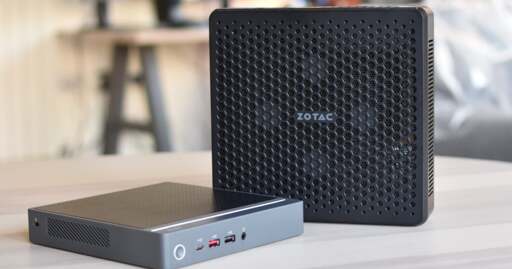Uh… It’s my server.
PSA about mini PCs: They might not come with adequate cooling for RAM, leading to potential data corruption.
(I’m in the middle of troubleshooting/fixing overheating RAM causing memory errors, will post on /c/selfhosted when I have more conclusions).
TLDR: Bought 3 Minisforum HM90 mini PCs (for Proxmox), equipped them with 64gb (2x32gb) RAM, with a different brand RAM in each PC. All 3 give sporadic errors in Memtest86. The RAM overheats due to the 2 SSDs mounted in the lid blocking natural airflow. With the lid off, or an extra fan installed, there are no errors. The errors were very sporadic: 1 PC gave errors after 1-2 passes, then almost 24hours. Second PC gave errors after more than 24 hours and some cases more than 48 hours between errors. The last PC gave hundreds of errors on the first pas. To be fair, memtest is a synthetic test and the RAM is unlikely to see 100% utilisation in real life, on the other hand the two adjacent SATA SSDs and the NVMe SSD are completely idle during memtest, and will generate extra heat during production use.
Take this seriously, people. I’ve been there and it caused tons of issues on an older server of mine. That’s why I was very adamant about my current system having built-in error correction for its RAM.
Had an NVME fritz out on me on a passively cooled NUC because of thermals, I suspect. That sucked.
Same. It seems weird not to mention that in the article, since it`s a very popular use case for them.
Like others have said, RPS is a gaming site, not a general purpose tech site, so it makes sense that they limit the scope of the article.
Mine as well.
It’s my server, another one is my HTPC and another one is my OPNSense router. My house has got hidden mini PCs everywhere.
Works great as a NAS controller, multimedia server and basic web server. Also works as an emulation server for older systems. Not so good for gaming, but there’s a LOT of computing that isn’t current gen game, audio or video editing, which are the three areas where most minipc rigs will fail.
Just make sure it gets enough cooling - run a temp monitor.
For context, Rock Paper Shotgun is a gaming site, which is why the reviewer focuses so heavily on game performance on different mini PCs. Unsurprisingly, the answer to the title isn’t an unequivocal “yes”, but some of the little lunch boxes fare quite well despite their limited specs.
A more accurate title would be “Should gamers bother with mini PCs,” but given their audience that would be superfluous 🙂 I think mini PC gaming will continue to be a niche interest, but there are certainly other and probably better uses for the tiny computers.
Over time, as CPUs get better integrated graphics, it might be worth it. Essentially, if you’re fine with playing last-gen games at ok framerates and you don’t need maxed-out graphics, a mini PC is an option. If you want to play recent AAA blockbusters at 100fps, obviously it’s a big no. But the next generation might get you close to those results on current-gen games.
There are already integrated graphics that can handle the most demanding games, like the ray-tracing-only Indiana Jones and the Golden Circle.
To be fair, I bought a really good mini pc for a home server. The problem is, it was marketed as a gaming pc. But with the on chip Intel HD graphics.
I can understand why this would upset people. For my uses though it was perfect. Sits in the TV cabinet, is quiet yet still quite powerful (intel 12900).
Yeah, terrific use for a mini PC. Will some self hosters and home labbers spit bile at the thought? Probably. It’s a matter of personal requirements.
Basically, like you say, most mini PCs are quiet, power efficient, and just carry that bit more oomph than a SBC.
Some of those things make killer HTPCs for the living room. Or Plex/Emby/Jellyfin servers.
Not every computer needs to handle AAA games at 240 fps.
You’re absolutely right!
At no point did I consider it being a entertainment system.
I think this is a great party idea.
I use one as a Jellyfin server and to stream my main gaming PC to my home theater setup via Moonlight. Works great and since it’s all wired LAN the latency added is under 10ms end to end
Gotta make sure the fan is quiet enough for it though.
I have an i7 NUC that I use as my jellyfin server cause it has hardware transcoding. It absolutely rips and takes up less electricity at full bore than my gaming desktop at idle. I agree that there’s a place for mini computers, but it’s probably not serious gaming.
Not to one-up you, but I’m doing the same with an Odroid H4+ board (no case yet, although I’ll probably 3D-print one), which has the exact same transcoding feature as part of its Core i3-N305. It can handle multiple 4K HDR streams just fine (at least in theory - I’m only serving three users at once at most and none of them are using 4K HDR) - all while being passively cooled and using about three smartphones worth of power. Note that I had to use a dummy HDMI plug in order to get the hardware decoder to kick in, since I am using this as a headless server.
I paid €240 for it new, which is a steal (although you have to get SODIMM DDR5 memory for it, which isn’t that cheap). On the official website, it’s available for $139, but that’s without shipping and import duties from South Korea.
Granted, apart from the transcoding feature, general-purpose performance is not even close to your i7, but I’m using less than half as much power for the same job. If you have an i7-1260P, you’re about 70% ahead in synthetic benchmark, but my little i3 is still an 8-core CPU that has about 25% more CPU processing power than an old i7-4790k that I was using on my main PC (including for gaming) until last year. Since I am limited by my storage array going through a single SATA cable anyway, that’s fine by me, especially since this thing replaced a significantly less performant Intel Atom-based mini PC I was previously using for the same purpose. My priorities were having multiple SATA ports, being low cost, efficient, quiet and small - and in that order.
People have also used the same board as a normal PC and reasonably capable low-end gaming/emulation machine, by the way. You can get a case that looks like a Nintendo GameCube straight from the manufacturer. Here’s an overview video that includes it being used for this purpose.
Very nice! I don’t find this a one up but I love the ingenuity. I managed to salvage this NUC from work because we shut down a zoom room from a agency we acquired at work and then disposed all the unneeded /nonuniform hardware. Before that point, I was looking at doing something quite similar to you.
I also had to use get an hdmi dummy plug. That was an annoying stumbling block. Just, why??
Apparently, it depends on whether or not a specific BIOS setting is available. I don’t think there was on this board, but I might be wrong, since I already had the plug lying around and immediately used it when QuickSync refused to work. If you haven’t had any experience with this before, it can definitely be annoying though.
I’m really interested in this! How do you passively cool something like that? It’s to get quite under load, no?
There’s just a big ol’ heat sink covering most of the board. Even under sustained 100% CPU load, I’ve never had it getting any hotter than 72° C, which is not even close to the maximum operating temperature of 105°. It’s sitting under a desk in a corner with practically no air flow, almost completely enclosed from all sides.
You might need some limited active cooling if you are using the device for gaming, like a large and slow fan as shown in the video, but I wouldn’t be surprised if you can get away without it.
wow… that’s incredible! thanks!
I bought one and put Bazzite on it. It’s now my kids’ gaming console. Integrated GPUs are perfectly cromulent for most casual games.
I never heard of bazzite before! Thank you for the recommendation!
I use a pretty basic one (with an N100 microprocessor and intel integrated graphics) as a TV box + home server combo and its excellent for that.
It’s totally unsuitable for gaming unless we’re talking about stuff running in DOSEmu or similar and even then I’m using it with a wireless remote rather than a keyboard + mouse, which isn’t exactly suitable for PC gaming.
Mind you, there are configurations with dedicated graphics but they’re about 4x the price of the one I got (which cost me about €120) and at that point you’re starting to enter into the same domain as small form factor desktop PCs using things like standard motherboards, which are probably better for PC gaming simply because you can upgrade just about anything in those whilst hardware upgradeability of mini PCs is limited to only some things (like SDD and RAM).
Wow, this goes against Betteridge’s Law of Headlines, but absolutely.
I’ve got a small stack of 1L PCs running a ProxMox and Kubernetes cluster and it’s been perfect. Highly recommend. I’ll probably get one for my wife’s desk when she sets it up as it’ll do everything she needs and more, and it’s tiny and you can get em cheap lightly used.
Any tips on finding cheap used ones, other than scrounging eBay and the like?
Find a brother in law that works in IT. I changed his brakes and he gave me three Optiplex micros that were e-wasted from his work.
To be fair, those are easy to find by the truckload even if you don’t have a brother in law in IT.
eBay, Amazon, sometimes you can snag deals when they release newer versions, they actually had a few on Black Friday/Cyber Monday.
Tbh, I got mine in a pack of 4 on eBay (I only needed 3), cleaned them out a bit, bumped the RAM and put new disks in them and they’ve been solid.
Betteridge’s Law of Headlines
It’s more like a myth than a real thing. Or rather, a pattern that is false so often that you can’t use it to guess if it’s true.
Haven’t seen anyone mention the biggest deal breaker with these for me. The thermal and dust management is truly awful. They tend to overheat and collect dust super easily. You’re lucky if you get 4 years out of these things before they burn themselves out. And guess what? Barely repairable to boot.
They are essentially like gaming laptops in this regard.
I switched to a mini pc about 1.5 years ago, and it’s been working out fine. I’ll probably get another one when it’s time to move on. One thing I like about my new setup is it’s more modular. I have 2 external SSD drives and a USB hub, both of which I can continue using when I swap out the ‘main’ pc. I have a fancy audio interface hub as well, so I’m not concerned about any lack of enough audio ports on the mini pc.
Since the dual core my mom was using was spitting blood, I got her a Minisforum with a good Black Friday discount; maybe overkill for the web+mail she’ll use it for, but at least its future proof. And that’s in my opinion what they nailed with the original iMacs and promptly forgot: the majority of people just need something to browse, send email and little more, a little gaming, no AI… a midrange notebook or these tiny boxes would do all of that well, and for quite a long time.
An 11th Gen Nuc runs my main server, a 13th gen runs my backup system
All I see these mini-PCs as, as just personal PCs. The kind you boot up, record things on like private documents, power off and proceed to do other tasks and things on your more expensive machine that can handle the workload. Like they’re meant to be PCs you do not want people discovering or see you using, so to say.
I just have a hard time seeing mini PCs as primary devices for everyday use, especially when their upkeep is poor and temperature management is poorer.













